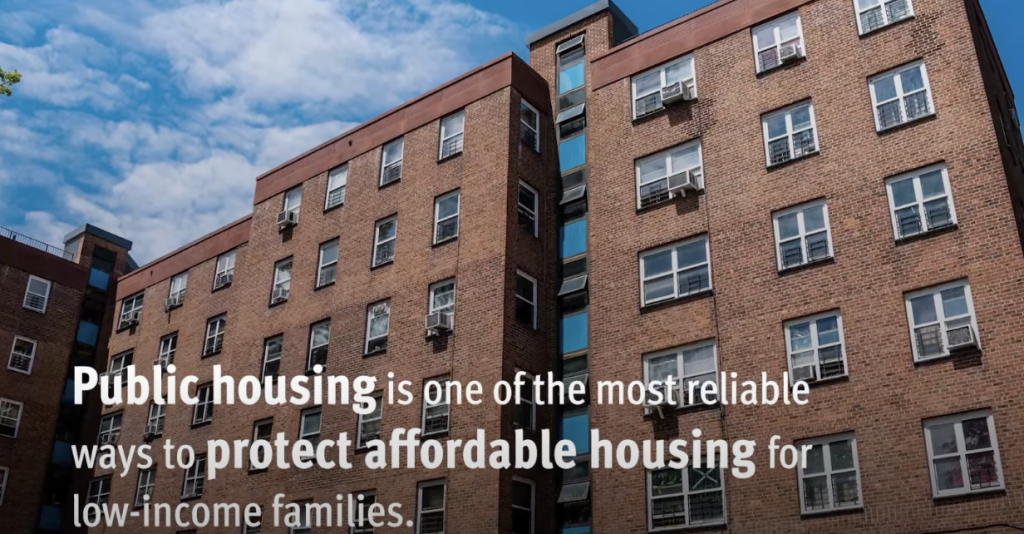
By Rebecca Martin
There are around 481 apartments managed by the Kingston Housing Authority that some say accounts for approximately 10% of the City of Kingston’s population. It is a critical source of deeply affordable and stable housing for very low and extremely low-income individuals, and particularly for people of color, single mothers, people with disabilities and seniors.
Over the last 20 years, budgets have been dramatically slashed for annual funding for repairs and everyday operations. These cuts have impacted both the availability and the habitability of housing. It has forced residents to live with heating system and plumbing failures, water leaks, pest infestations, peeling lead paint, and harmful mold. Years of deferred maintenance has caused the cost of repairing these homes to skyrocket. Steadily, public housing in municipalities are being taken over by private investors to manage and maintain these properties.
What is the Kingston Public Housing Authority?
According to its website, “The Kingston Housing Authority (KHA) provides homes for low-income City of Kingston Families and is an organization with a proud history and enviable reputation. In 1948 its dream of quality, affordable housing for area citizens was formalized. In 1953, it was put into action with the opening of Colonial Gardens. Over the years, hundreds of apartments were constructed and have provided the foundations for family and elderly communities around Kingston.”
The Authority is governed by a seven-member board, five commissioners that are appointed by the City’s Mayor with two elected members by the tenants
Today the Housing Authority manages six different communities that include:
- Colonial Gardens
- Colonial Gardens Addition
- Wiltwyck Gardens
- Rondout Gardens
- Stuyvesant Charter
- Brigham Senior Housing
The KHA’s properties serve residents with Area Median Income (AMI) that, according to HUD, include Very Low Income (31-50% AMI) and Extremely Low Income (0-30% AMI).
In a recent post, we reported on Kingston’s Form-Based-Code including in its most recent draft a Pilot-in-lieu of Affordable Housing (PILOAH) that would lead to an Affordable Housing Fund. Last week, we learned that the city staff had already hired a consultant to provide guidance on creating a fund even though a PILOAH hasn’t yet been approved. Although the verdict is still out as to whether or not that’s a good idea, if it does come into play, then this is the population that that fund should serve.
In a 2021 report by New York State Comptroller Thomas P. DiNapoli, DiNapoli found that the Kingston Housing Authority “did not provide adequate oversight of Authority operations. As a result: Budgets were not entered into the financial system and financial transactions were not properly captured; Adequate oversight of disbursements, bank transfers and bank reconciliations were not achieved; $6.51 million in disbursements and bank transfers were made without review or approval; $1,035 in management fees were incorrectly billed; Financial system access was not properly administered.”
When important programs fail, it’s generally due, at least in part, to poor management. Privatizing our public housing complexes in Kingston as a preferred solution to deferred maintenance is a bad outcome that is not well understood by the community.
Privatizing public housing in the City of Kingston: Mountco awarded bids on Stuyvesant Charter in addition to four other public housing complexes.
At last month’s Kingston Common Council caucus, Ward 9 council member Michelle Hirsch provided an update on Kingston Housing Authority developments, including the most recent Request for Qualifications (RFQ) issued by the Kingston Housing Authority in October of 2021 of a redevelopment and new development proposal for four of Kingston’s public housing complexes that include Colonial Gardens, Colonial Gardens Addition, Wiltwyck Gardens (all state funded complexes) and Rondout Gardens (the sole federally funded complex).
As an aside, can the KHA mix federal and state housing complexes together for an RFQ?
The RFQ request was seeking developer applications to be submitted by January of 2022 for a developer selection to be made by February, 2022. Because the Kingston Housing Authority hasn’t any minutes or documents listed on their website, we don’t know how many applications were submitted or how the projects were rated before Mountco Construction and Development (Mountco) was awarded the bid. According to sources, they are already walking through the Colonial Gardens Addition and Rondout Gardens. If that’s true, then we presume those will be the first on their list for improvements.
Four years ago, the Kingston Housing Authority issued an RFQ for the Stuyvesant Charter Apartments, which was also awarded to Mountco. They are currently making renovations and moving residents into “pods” while making these improvements. According to Hirsch’s update, a ribbon cutting is slated for May where folks from Albany are expected to attend.
The City of Kingston looks to be well underway in privatizing its public housing complexes. According to the NYS Public Housing Law article 58, it says that the “Sale of dwelling units by authorities” of any state or federal public housing project requires the “local legislative body in the case of a municipal project” to have a say in the sale of public housing units. Did the Kingston Common Council weigh in and if not, should they have? What about the general public? How can we engage on what happens to public housing in Kingston in order to provide input to protect our most vulnerable residents?
If you have concerns about public housing in Kingston, you can contact your council member. Ward 3 council member Rennie Scott Childress also serves on the KHA board. You can reach out to him, too, independently to learn more.
